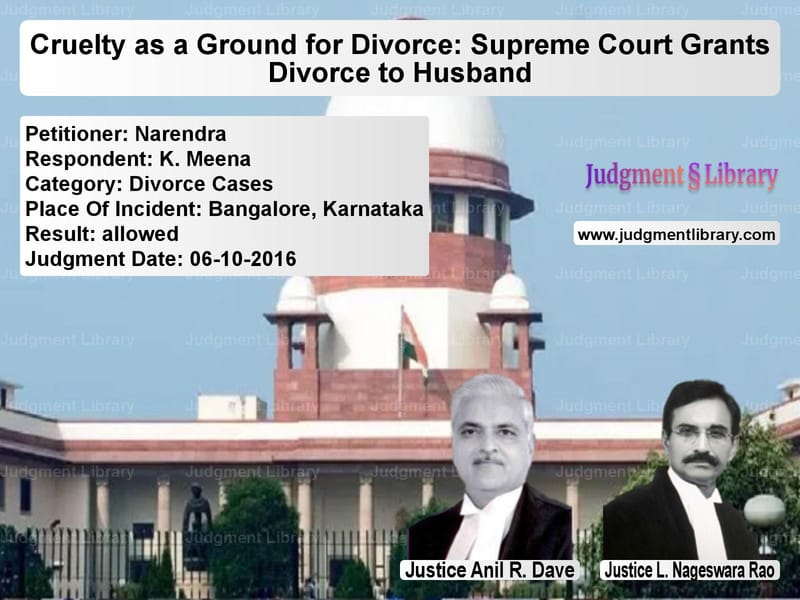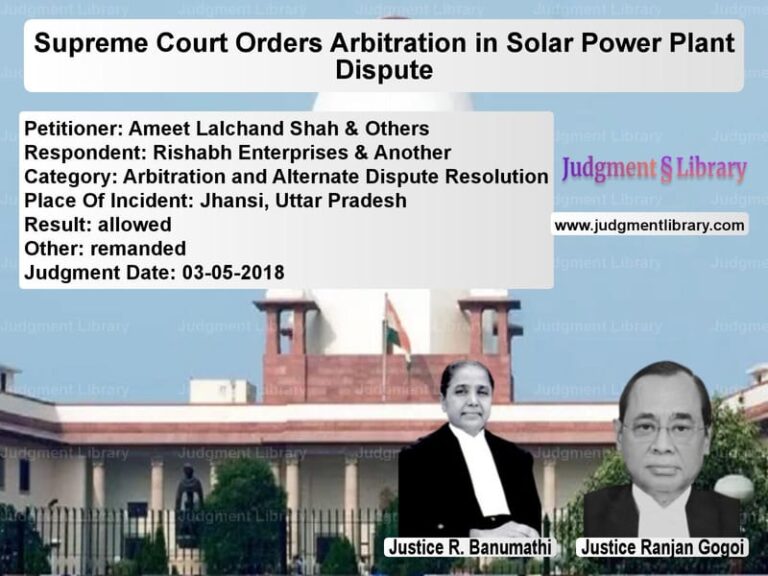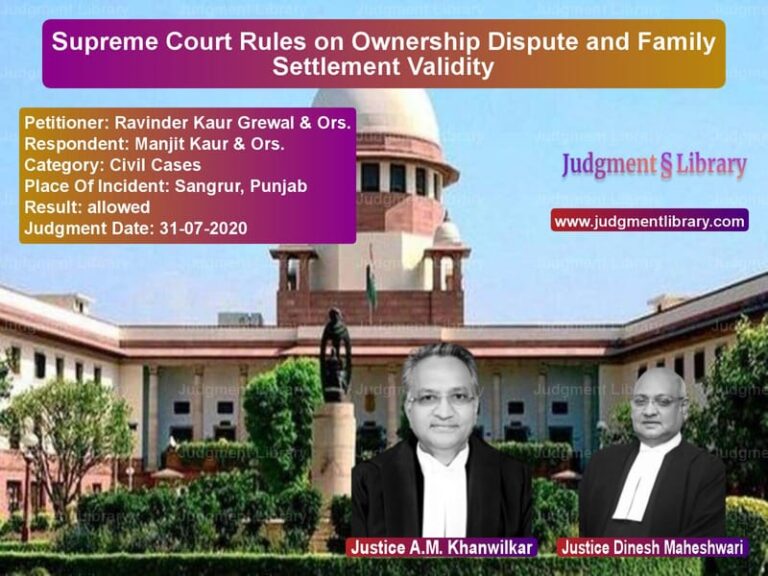Cruelty as a Ground for Divorce: Supreme Court Grants Divorce to Husband
The Supreme Court of India, in the case of Narendra v. K. Meena, delivered a significant judgment on October 6, 2016, addressing the issue of cruelty as a ground for divorce under the Hindu Marriage Act, 1955. The case involved a long-standing marital dispute where the husband sought divorce on the grounds of mental cruelty, which was initially granted by the Family Court but later reversed by the Karnataka High Court.
The Supreme Court overturned the High Court’s decision, reinstating the decree of divorce, and held that persistent cruelty, including false allegations of infidelity, suicide threats, and insistence on separation from family, amounted to valid grounds for divorce under Section 13(1)(ia) of the Hindu Marriage Act.
Background of the Case
The appellant, Narendra, married the respondent, K. Meena, on February 26, 1992. The couple had a daughter, Ranjitha, born on November 13, 1993. According to Narendra, the marriage was troubled from the beginning, as Meena exhibited a highly suspicious nature and accused him of having an extramarital affair with a maid named Kamla. She also allegedly insisted that he sever ties with his family and live with her separately.
On July 12, 1995, following a heated argument, Meena attempted suicide by pouring kerosene over herself in a locked bathroom. She was rescued by Narendra, his brother, and neighbors. The incident deeply affected Narendra, making it impossible for him to continue living with her. Consequently, he filed for divorce under Section 13(1)(ia) of the Hindu Marriage Act, citing cruelty.
Arguments Presented
Petitioner’s (Narendra’s) Arguments
- Meena repeatedly accused him of having an affair with a maid, despite no evidence to support the claim.
- She frequently threatened to commit suicide, causing him immense mental distress.
- On July 12, 1995, she attempted suicide, which could have led to serious legal consequences for him.
- She persistently pressured him to leave his parents and live separately, knowing well that he was the sole breadwinner for his family.
- Her behavior made it impossible for him to continue the marriage, as it caused severe emotional and mental agony.
Respondent’s (Meena’s) Arguments
- The allegations of cruelty were exaggerated and baseless.
- She had a legitimate expectation that her husband should prioritize her over his extended family.
- The attempt to commit suicide was not aimed at harming Narendra but was an emotional response to marital disputes.
- Her accusations regarding his infidelity were based on genuine suspicions and not meant to defame him.
Supreme Court’s Judgment
The Supreme Court carefully examined the evidence and upheld the Family Court’s findings, ruling that Meena’s conduct constituted mental cruelty. The key observations made by the Court included:
- On False Allegations of Infidelity: The Court held that making baseless accusations of an extramarital affair can cause immense mental distress and amounts to cruelty.
- On Suicide Threats: The Court noted that repeated threats of suicide create an environment of fear and stress, which can be emotionally draining for a spouse.
- On Forcing Separation from Family: The Court reaffirmed that in Indian culture, it is a son’s duty to care for his parents, and demanding that a husband abandon his family without a justifiable reason is cruel behavior.
- On the Legal Consequences of Suicide Attempts: The Court highlighted that if Meena had succeeded in her suicide attempt, Narendra could have faced severe legal repercussions, which was a significant cause of mental agony.
The Court stated: “Had she been successful in her attempt to commit suicide, the appellant would have been put to immense difficulties because of the legal provisions. The thought itself is distressing. Such mental cruelty could not have been taken lightly by the High Court.”
Key Legal Precedents Cited
The Supreme Court relied on several landmark judgments concerning mental cruelty in marriage:
- Pankaj Mahajan v. Dimple @ Kajal (2011): Held that giving repeated threats to commit suicide amounts to mental cruelty.
- Vijaykumar Ramchandra Bhate v. Neela Vijaykumar Bhate (2003): Established that false allegations of infidelity cause immense mental pain and can be grounds for divorce.
- Gurbux Singh v. Harminder Kaur (2010): Stated that persistent and unjustified accusations against a spouse amount to cruelty.
Impact of the Judgment
The ruling has significant implications for divorce cases in India:
- Strengthening Mental Cruelty as a Ground for Divorce: The judgment affirms that persistent false accusations, emotional blackmail, and threats of suicide constitute cruelty.
- Recognizing the Rights of Spouses: The decision ensures that individuals are not forced to endure abusive relationships under societal pressures.
- Preventing Misuse of Matrimonial Laws: The ruling deters individuals from making false allegations and using emotional manipulation to control their spouses.
Conclusion
The Supreme Court’s judgment in Narendra v. K. Meena is a landmark decision that reinforces mental cruelty as a legitimate ground for divorce. By granting relief to Narendra, the Court acknowledged that continuous mental harassment, false accusations, and suicide threats can make a marriage unbearable.
This ruling sets a precedent for future divorce cases, ensuring that individuals are not trapped in toxic relationships due to outdated societal norms. It serves as a reminder that marriage should be built on mutual respect and trust, and when that foundation is destroyed, legal intervention is necessary to protect the well-being of individuals.
Don’t miss out on the full details! Download the complete judgment in PDF format below and gain valuable insights instantly!
Download Judgment: Narendra vs K. Meena Supreme Court of India Judgment Dated 06-10-2016.pdf
Direct Downlaod Judgment: Direct downlaod this Judgment
See all petitions in Alimony and Maintenance
See all petitions in Domestic Violence
See all petitions in Divorce by Desertion
See all petitions in Judgment by Anil R. Dave
See all petitions in Judgment by L. Nageswara Rao
See all petitions in allowed
See all petitions in supreme court of India judgments October 2016
See all petitions in 2016 judgments
See all posts in Divorce Cases Category
See all allowed petitions in Divorce Cases Category
See all Dismissed petitions in Divorce Cases Category
See all partially allowed petitions in Divorce Cases Category







